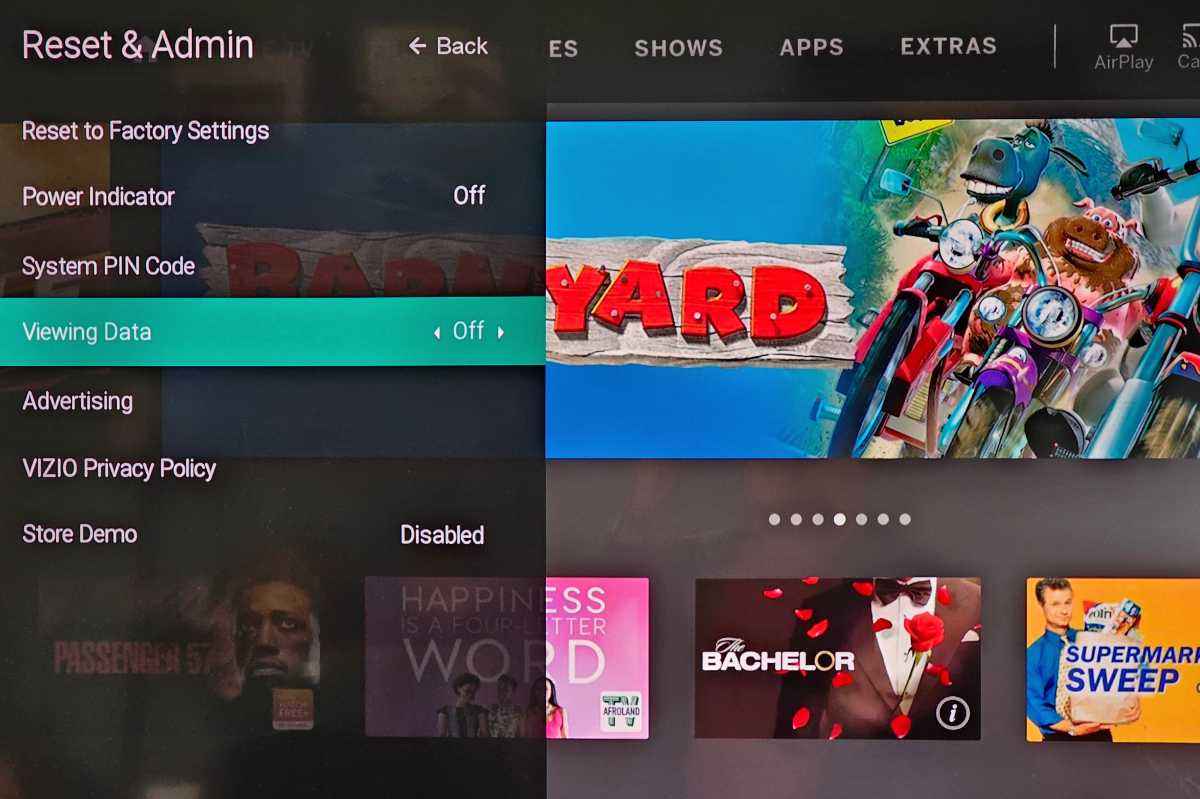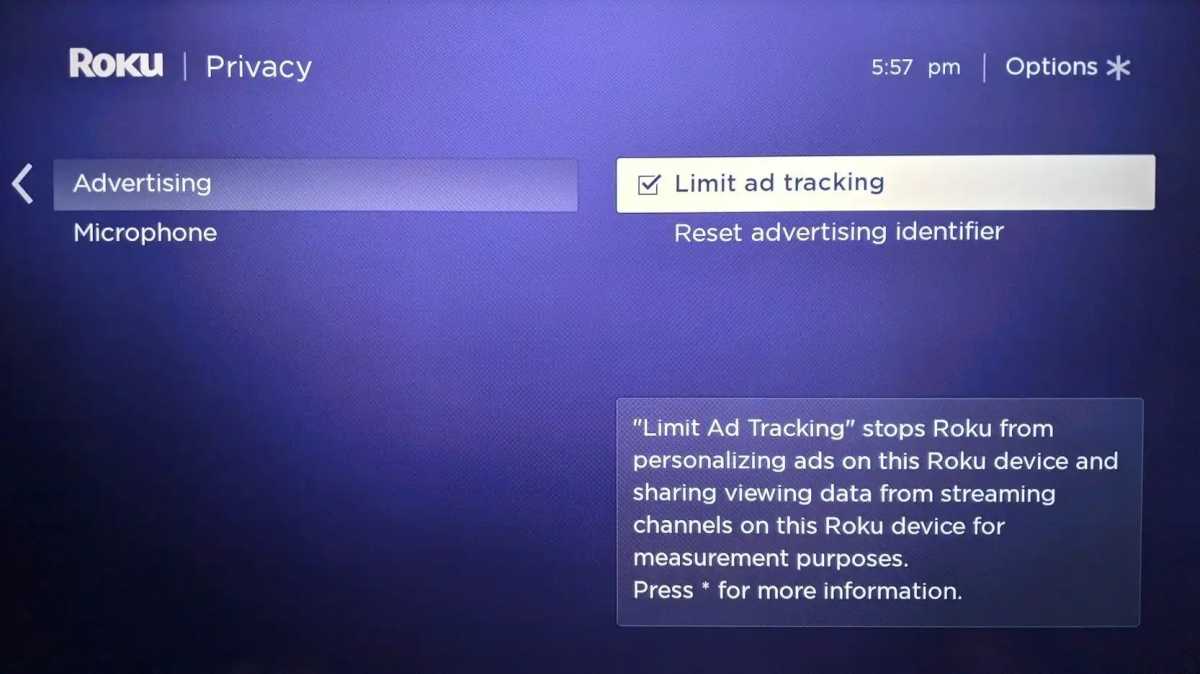How to protect your privacy from streaming TV services

While cord-cutting has created all kinds of ways to watch TV for cheap, it’s also opened up the door to a lot more personal data collection.
Your viewing habits are deeply valuable to marketers, who can infer a lot about you based on the things you watch. And unlike on phones and computers, where privacy-centric web browsers and tracker blockers can provide some level of defense, streaming devices are a place where the data still flows freely.
But with a little bit of effort, you can dial back the data collection and limit which companies are privy to your viewing habits.
None of the steps below will make streaming ads go away, and they aren’t entirely foolproof at preventing data collection, but they do provide some extra peace of mind about who’s watching back when you sit down in front of the TV:
Step 1: Turn off smart TV snooping

Jared Newman / Foundry
Virtually all smart TVs have the ability collect data about what you’re watching, not just on their own streaming interfaces, but across any input, including cable boxes and game consoles. This technology, called automatic content recognition, or ACR, essentially watches what you watch, identifies the content, and builds a profile of your behavior for ad-targeting or marketing purposes.
Consumer Reports and The Streamable both have thorough guides on how to turn off tracking features on smart TVs, but here are some quick shortcuts for ACR in particular:
- Samsung TVs: Hit the home button and head to Menu > Settings > All Settings > General & Privacy, then disable “Viewing Information Services.”
- LG TVs: Head to Settings > All Settings > Support > Privacy & Terms > User Agreements, then disable “Viewing Information.”
- Roku TVs: Head to Settings > Privacy > Smart TV Experience, then turn it off.
- Fire TV Edition TVs: Head to Settings > Preferences > Privacy Settings > App and Over-the-Air Usage, then turn it off.
- Sony TVs: Head to Settings > System Preferences > Interactive TV Settings (or Samba Interactive TV), then turn it off.
- Vizio TVs: Head to Menu > System > Reset & Admin > Viewing Data, then turn it off.
Alternatively, you can disconnect your smart TV from the internet and effectively use it as a dumb TV with an external streaming player. Simply locate your TV’s Wi-Fi settings and “Forget” your wireless network, and it won’t be able to phone home. Streaming players have their own privacy issues—more on those shortly—but at least the tracking’s a bit easier to contain.
Step 2: Minimize ad targeting

The “Limit Ad Tracking” setting on Roku devices.
Jared Newman / Foundry
Whether you’re using a smart TV or external streaming device, they both have additional settings that allow the device maker to target ads based on your viewing habits. This works by assigning you a unique identifier, associating your viewing data with it, then targeting ads around that data.
Buried deep in these devices’ settings, however, you’ll find options to disable that unique identifier, limiting targeted ads as a result:
- Roku: Head to Settings > Privacy > Advertising, then check “Limit ad tracking.”
- Fire TV: Head to Settings > Preferences > Privacy Settings, then turn off “Device Usage Data,” “Collect App Usage Data,” and “Interest-based ads.”
- Google TV/Android TV: Head to Settings > Device Preferences > Usage Diagnostics and turn this setting off. Then head to Settings > Device Preferences > About > Legal Information > Ads, and select “Delete Advertising ID.”
- Apple TV: Head to Settings > General > Privacy > Tracking. Turn off “Allow Apps to Ask to Track” and make sure individual apps are set to “Off.”
- Samsung TVs: Head to Menu > Settings > All Settings > General & Privacy,then turn off Interest-Based Advertising.
- LG TVs: Head to Settings > All Settings > Support > Privacy & Terms > User Agreements, then disable “Interest-Based Advertisements.”
- Vizio TVs: Head to Menu > System > Reset & Admin > Advertising, then turn “Limited Ad Trcking” to “On.” (Yes, “On” in this case means you’re turning off unlimited tracking.)
Keep in mind that these settings won’t prevent individual companies from collecting their own viewing data for ad targeting, but it will hinder them from showing ads based on your activity in other apps and services.
Step 3: Tell companies not to sell your data

Jared Newman / Foundry
Even after disabling all the above settings, individual streaming companies can still collect their own data on your viewing habits, then share it with marketing or ad tech firms for further targeting.
That’s where state laws such as the California Consumer Privacy Act come in. Under these laws, companies are now required to offer a “Do Not Sell My Data” option, precluding them from sharing data for ad targeting purposes. Most streaming companies will honor opt out requests even if you don’t live in California.
Finding these opt-out forms isn’t always easy, but here are links for major streaming platforms and providers that offer a “Do Not Sell” option:
As an additional step, check out Permission Slip, a great app from Consumer Reports that can automate opt-out requests to major brands and data brokers.
Step 4: Use masked email addresses and private credit cards

Jared Newman / Foundry
Using masked email addresses is another way to protect your privacy from streaming services. Your regular email, after all, is a kind of unique identifier, one that companies use to track your behavior across apps and services. Setting up unique email addresses for each service can hinder this kind of tracking. It’s also a handy way to wring extra free trials or new subscriber discounts out of your streaming services.
I’ve previously rounded up some masked email options over at PCWorld, including Ironvest, Anonaddy, and DuckDuckGo Email Protection. These services let you generate aliases that forward to your actual inbox, so your true email address stays hidden.
While you’re at it, consider setting up limited-use credit cards for streaming services as well. These will further protect your privacy by assigning a unique card number to each service, plus you can use them to set spending limits or automatically cancel after a period of time.
Is all this effort worth it?
Let’s be honest: The benefits from all this effort will be largely intangible. If anything, you’ll notice ads becoming less relevant to your interests as companies lose access to your data. There’s also no guarantee that companies won’t find a way to track you even after you’ve taken all the above steps.
Still, I’ve seen enough stories on smart TV snooping go viral to know that there’s value simply in the feeling of not being watched.
Sign up for Jared’s Cord Cutter Weekly newsletter for more help navigating the streaming TV world.
